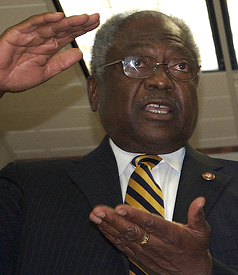Washington – The looming vote for final passage of the historic health-care bill is the stiffest challenge House Majority Whip Jim Clyburn has faced in his three-plus years as the lawmaker responsible for counting heads and ensuring passage of major legislation.
The South Carolina Democrat has spent the past week in endless meetings and conversations with key factions of Democrats in the House of Representatives, among them black, Hispanic and the fiscally conservative “Blue Dog” lawmakers.
The forthcoming health-care vote puts Clyburn, the highest-ranking African-American in Congress, in the tough position of securing enough Democratic support to gain final passage of a historic initiative that will help define the legacy of President Barack Obama. Thirty-nine Democrats voted against the original House health-care measure in November, 24 of them Blue Dogs.
The outcome, he said, could be tighter than the 220-215 vote by which the House passed the original health-care bill in November.
“I need 216 votes to pass this bill,” Clyburn told McClatchy. “I think I’m going to get 216 votes. It could be closer than last time. All I want is 216 votes.”
A month after Obama took office in January 2009, the House passed his $862 billion economic-stimulus plan. Clyburn lost just seven Democrats in the 246-183 vote.
“The stimulus vote was nothing compared to this,” Clyburn said.
Obama, who’s set a Thursday deadline for final passage of his top legislative priority, postponed a trip to Asia by three days to pressure or cajole wavering Democrats.
Clyburn expressed doubt that the House would vote by Thursday. He said lawmakers might have to stay in Washington right up to Easter Sunday, wrangling over their differences, and he wasn’t certain the showdown vote would take place by then.
“The chances are good, but I wouldn’t bet on it,” he said.
Clyburn cited three changes that he said might help him change November “no” votes into “yes” votes among House Democrats:
- The latest version drops a “public option” for a new government-run health care plan on the scale of Medicare or Medicaid. The modified measure still requires Americans to buy health insurance, but it provides tax credits and other subsidies to help moderate- and low-income people purchase coverage from private companies.
- The new bill drops a “millionaires’ tax” that would have imposed a 5.4 percent surcharge on wealthy Americans.
- The November House legislation carried a $1 trillion price tag, while the measure that passed the Senate a month later would cost $875 billion. The modified House bill will carry a price tag in the range of $955 billion.
Clyburn was frustrated by news reports focusing on the Democratic votes he might lose from the November tally — starting with anti-abortion Democrats upset that abortion-funding limits have been loosened since then.
Clyburn said those vote-switchers — perhaps between five and 10 — would be more than offset by new supporters lured by other changes.
One crucial addition, he said, is the addition of up to $7 billion in college student aid.
Clyburn took the unusual step of naming four former Democratic opponents who he’s hopeful are preparing to vote for the reform legislation: Reps. Brian Baird of Washington state, Jason Altmire of Pennsylvania, Bart Gordon of Tennessee and John Boccieri of Ohio.
“That’s four people right there who voted no before,” Clyburn said. “Why don’t we talk about them? Everyone’s talking about who we might lose.”
In the health-care showdown, Clyburn will actually have to manage two related votes in the House.
First, lawmakers must vote on the Senate health-care legislation exactly as it emerged from that chamber in December.
That’s the only way Democrats can avoid a second, final passage vote in the Senate, where Massachusetts Republican Sen. Scott Brown’s victory in a January special election to succeed the late Sen. Edward Kennedy removed their critical 60th vote.
As a result, Obama and Democratic congressional leaders decided to put all the additions and other legislative changes into a separate “corrections” measure that will require only a simple majority for passage in the Senate.
Through this process, called reconciliation, Democrats can move budget-related legislation through the Senate with 51 votes instead of the usual 60 required to end debate and move to final passage.
The two votes give Clyburn the tough task of persuading Democrats to vote for a Senate measure that he himself dislikes based on the promise that they’ll fix it in the separate reconciliation bill.
Clyburn would like to see the two measures go to the House in tandem and then hold back-to-back votes on them.
Under that scenario, the original Senate bill, having been passed by both chambers, would go to Obama for his signature. The corrections measure, meanwhile, would move to the Senate.
“That’s what I consider the way forward,” Clyburn said. “There are other ways to do this. (House Speaker Nancy Pelosi) may not like the way I want to do it.”
Clyburn laughed and added: “She may have a better way. She usually does.”
Join us in defending the truth before it’s too late
The future of independent journalism is uncertain, and the consequences of losing it are too grave to ignore. To ensure Truthout remains safe, strong, and free, we need to raise $44,000 in the next 6 days. Every dollar raised goes directly toward the costs of producing news you can trust.
Please give what you can — because by supporting us with a tax-deductible donation, you’re not just preserving a source of news, you’re helping to safeguard what’s left of our democracy.
